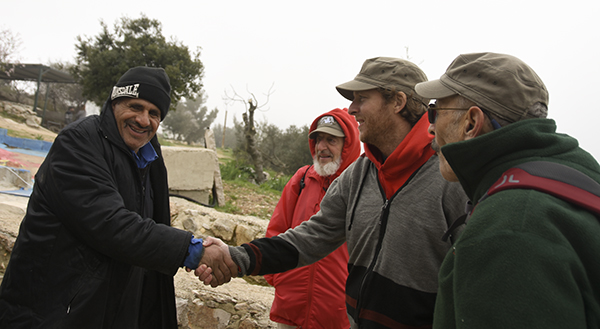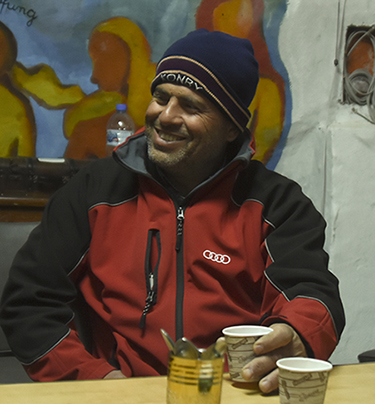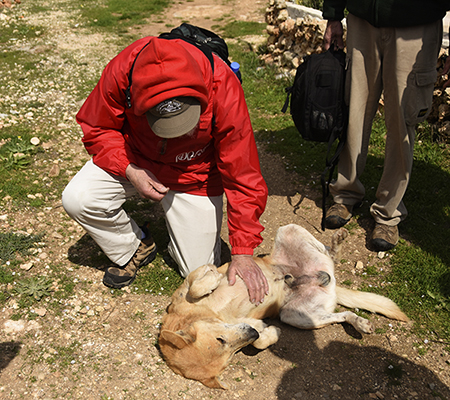By Ken Mayers

The hilltops surrounding the Tent of Nations farm are all covered by Israeli settlements. PHOTO: ELLEN DAVIDSON
Yesterday (March 3, 2017) our Veterans For Peace delegation spent six hours at the Tent of Nations, a private farm on a hilltop overlooking the village of Na-Haleen, on the outskirts of Bethlehem. The village is surrounded by hilltops, all but one of which are occupied by illegal Israeli settlements, the exception being the farm, known to locals as “Daher’s Vineyard.” The farm was started in 1916 by the Nassar family, which has deeds signed by Ottoman authorities at its founding, and subsequently by British Authorities during the protectorate and by the Jordanian authorities in the Transjordan period. We were greeted by Daher Nassar, a grandson of the founder, one of three brothers who continue to operate the farm.
In 1992, it was declared Israeli state land. The farm took the case to court and has been fighting the case ever since. The legal costs now exceed $200,000. In 2001, settlers started to build a road across the farm. The Nassars took their documents to the police and pressured them into stopping the construction. That case has been before the Supreme Court for 15 years.
The Nassar family are Christians, both in terms of professed faith in actual practice. They have developed a powerful form of resistance based on non-violence principles including refusal to become victims, self-reliance in overcoming difficulties, welcoming all who come in peace, and summed up: “we refuse to be enemies.”
From their website:
“At Tent of Nations, we seek to embody a positive approach to conflict and occupation. Faced with great injustice, we know that we should not hate, despair, or flee. We can refuse to be enemies and channel our pain and frustration into positive actions which will build a better future.
“We aim to help the oppressed and marginalized realize that they are powerful. We all have a role in creating the future we want to see. At Tent of Nations, we seek to work with others in the local area to lay the foundations for a future Palestine, in the belief that justice and peace will grow from the bottom up.”
While it remains a privately operated farm, it is also an educational center for both adults and children, welcoming groups around the year and offering summer camps for kids aged 8-15, teaching teach arts, crafts, and music as well as principles of sustainable agriculture. (Up until about eight years ago, some Jewish children from progressive Jerusalem families came to the camp along with Palestinian children from the Bethlehem area.) In the village of Na-Haleen they provide workshops for the empowerment of women, conducted while children are in school so their mothers can attend. There are special “harvest camps” four times in the summer and fall, timed to the harvest season for figs, apricots, olives, and grapes. At the end of the summer camp for children, the kids perform for their parents, music, dance, and dramatic skits in the outdoor “Solomon’s Theatre,” a mosaic-tiled area where there are also pits connected to a drainage system and a cistern. The kids even get to stamp the grapes to produce the juice that will flow into the cistern to be transformed into wine.
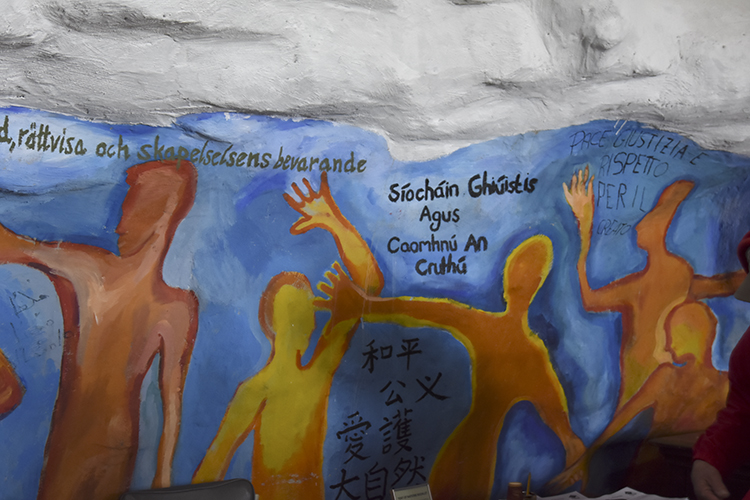
The walls of the meeting cave are covered with a mural and the words “Peace, Justice, and Conservation of Creation” in many languages. PHOTO: ELLEN DAVIDSON
The original habitations on the farm were caves, very similar to those inhabited by the
Anasazi of Northern New Mexico 1000 years ago. They provide relief from the heat in the summer and from the cold in the wither, as we learned firsthand when we ducked inside from a very chilly fog. Although a few rudimentary framed structures have been built in the intervening years, the caves remain in use as meeting rooms, classrooms, storage areas, and a small shop where jams, jellies, wine, and crafts produced on the farm are sold. Israeli refusal to grant building permits for ANY kind of structure has resulted in the demolition even of tents intended for the summer campers.
In 2001, the Israeli authorities cut off water and electricity to the farm. Since then the farm has had to purchase water and electricity at a high price. But applying the principle of self-reliance, the Nassars developed a system of rainwater capture and cisterns for storage and more recently have added solar panels to replace the purchased electricity. To reduce water use, composting toilet outhouses have been built. All over the camp, rocks are decorated with directional signs, biblical sayings, and artwork, mostly created by the summer campers.
The educational mission is carried out by the brothers, assisted by volunteers from around the world. As Daoud, Daher’s younger brother, told us, the volunteers often benefit in ways far beyond expectations. He told us one touching story about a volunteer who wrote to the Nassars after her period at the camp, saying that she had a young adult musician son who was suffering from chronic depression that she thought might be relieved by playing a constructive role at the camp. The Nassers were worried about accepting such a responsibility, but in the end they felt that their principles would not allow them to deny the request. As it turned out, the young man rapidly became the favorite counselor in the summer camp and experienced an outpouring of love that overcame his depression and turned his life around.
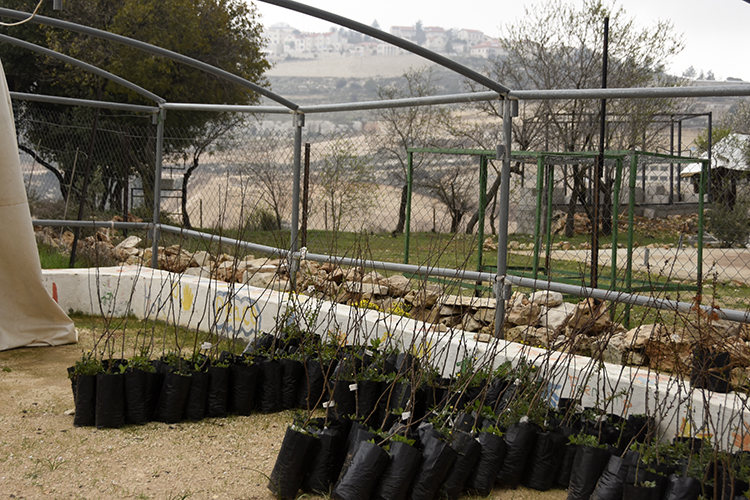
Trees ready for planting. Daoud says that for every tree the settlers uproot, they try to plant two replacements. PHOTO: ELLEN DAVIDSON
The farm continues be hassled by the nearby settlements, but the four sweet dogs on the premises provide an early warning system. (They also have been known to keep the family cat up in a tree until they go to sleep for the night.). So far, the original roughly 100 acres remain intact.

